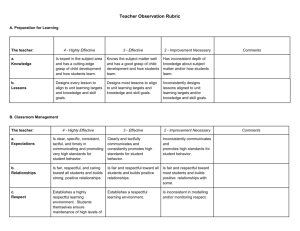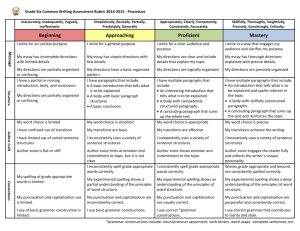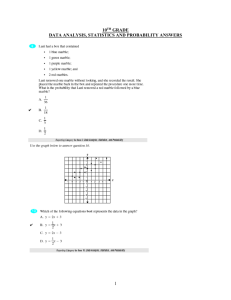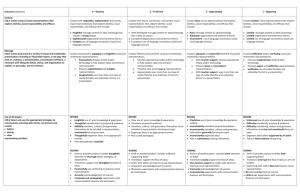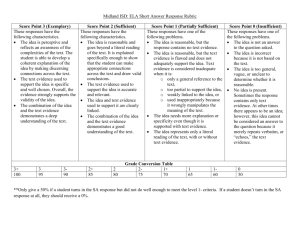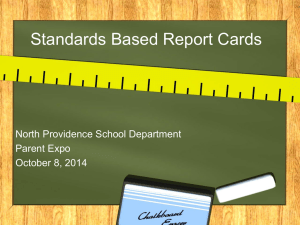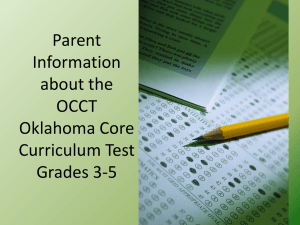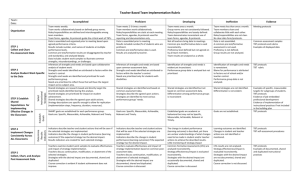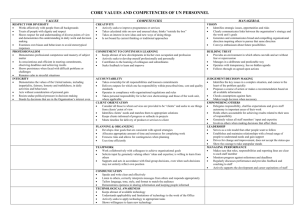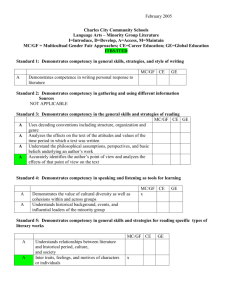family medicine sub-internship feedback and evaluation form
advertisement
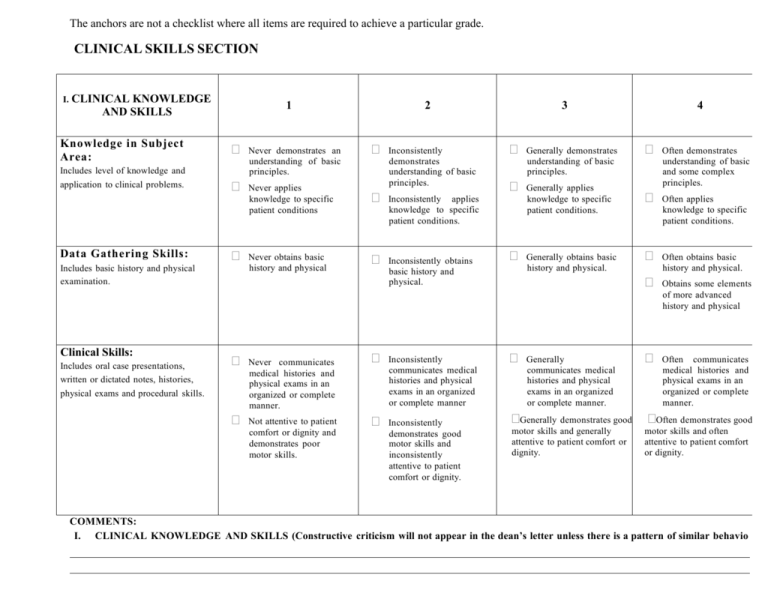
The anchors are not a checklist where all items are required to achieve a particular grade. CLINICAL SKILLS SECTION I. CLINICAL KNOWLEDGE AND SKILLS Know ledge in Subject Area: Includes level of knowledge and application to clinical problems. Data Gathering Skills: 1 Includes basic history and physical examination. Clinical Skills: Includes oral case presentations, written or dictated notes, histories, physical exams and procedural skills. Never demonstrates an understanding of basic principles. 2 Never applies knowledge to specific patient conditions Never obtains basic history and physical Never communicates medical histories and physical exams in an organized or complete manner. Not attentive to patient comfort or dignity and demonstrates poor motor skills. Inconsistently demonstrates understanding of basic principles. 3 Inconsistently applies knowledge to specific patient conditions. Inconsistently obtains basic history and physical. Inconsistently communicates medical histories and physical exams in an organized or complete manner Inconsistently demonstrates good motor skills and inconsistently attentive to patient comfort or dignity. Generally demonstrates understanding of basic principles. Generally applies knowledge to specific patient conditions. Generally obtains basic history and physical. 4 Generally communicates medical histories and physical exams in an organized or complete manner. Often demonstrates understanding of basic and some complex principles. Often applies knowledge to specific patient conditions. Often obtains basic history and physical. Obtains some elements of more advanced history and physical Often communicates medical histories and physical exams in an organized or complete manner. Generally demonstrates good Often demonstrates good motor skills and generally attentive to patient comfort or dignity. motor skills and often attentive to patient comfort or dignity. COMMENTS: I. CLINICAL KNOWLEDGE AND SKILLS (Constructive criticism will not appear in the dean’s letter unless there is a pattern of similar behavio 1 II. Patient Care Skills Integration Skills: Includes problem-solving skills, ability to use data from patient interview, physical examination, and ancillary tests to identify major and minor patient problems in an organized and efficient manner. Management Skills: Includes order writing, initiative, practicality, and independence. Patient Centered Care (PCC): Skills including: 1.Elicits and negotiates agenda for the patient; 2. Elicits the patient’s perspective of their illness; and 3.Negotiates treatment plan with the patient Never independently identifies major patient problems. Unable to problem solve and organize issues efficiently. Never offers an independent management plan or plan is unrealistic or illogical. Never elicits and negotiates agenda with patients. Never elicits the patient’s perspective of his/her illness. Never negotiates treatment plan with the patient. Never integrates biomedical and psychosocial perspective into care plan and patient management 2 Inconsistently able to independently identify and prioritize major problems. Inconsistently able to problem solve and organize efficiently. Inconsistently offers an independent management plan and/or plan is often unrealistic or illogical. Inconsistently elicits and negotiates agenda with patients. Inconsistently elicits the patient’s perspective of his/her illness. Inconsistently negotiates treatment plan with the patient. Inconsistently integrates biomedical and psychosocial perspective into care plan and patient management. 3 Generally able to independently identify and prioritize major problems. Generally able to problem solve and organize efficiently. Generally offers an independent management plan that is realistic and logical. Generally elicits and negotiates agenda for the patient. Generally elicits the patient’s perspective of his/her illness. Generally negotiates treatment plan with the patient. Generally integrates biomedical and psychosocial perspectives into care plan and management of the patient. 4 Often is able to identify and prioritize all major and most minor patient problems. Often is able to problem solve and organize efficiently. Often offers an independent management plan that is logical and realistic. Often elicits and negotiates agenda with the patient. Often elicits the patient’s perspective of his/her illness. Often negotiates treatment plan with the patient. Often integrates biomedical and psychosocial perspectives into care plan and management. COMMENTS: II. Patient Care Skills (Constructive criticism will not appear in the dean’s letter unless there is a pattern of similar behavior across other Sub-Is 1 Relationships Communication Skills: Student’s ability to communicate with patients, families, colleagues, and staff; Includes ability to modify communication style and ability to listen and constructively resolves conflicts. Relationships with Patients and Families: Includes courtesy, empathy, respect, compassion and understanding the patient’s perspective. Professional Relationships: Ability to work collaboratively with team members including faculty staff and other students; courteous and cooperative attitude. Maintains composure in times of stress. Never communicates information effectively Never has an awareness to modify communication style and content to situation. Unable to establish rapport. Unable to listen and be silent. Never culturally proficient. Disrespectful, indifferent, callus, discourteous or condescending. Does not solicit the patient‘s perspective. Imposes own personal values on patient when in conflict with their own. 2 Inconsistently communicates information effectively. Inconsistently has an awareness to modify communication style and content to situation. Inconsistently able to establish rapport. Violates HIPPA including patient confidentiality. Inconsistently able to listen and be silent. 3 Generally communicates information effectively Generally modifies communication style and content to situation. Generally able to establish rapport. Generally able to listen and be silent. Generally culturally proficient. 4 Often communicates information. Often modifies communication style and content to the situation. Often able to establish rapport. Often able to listen and b e silent. Often culturally proficien Inconsistently culturally proficient. Inconsistently shows respect, empathy and compassion. Inconsistently solicits the patient’s perspective. Inconsistently respects patient’s values or imposes own personal values on patient when in conflict with their own. Generally demonstrates respect, empathy and compassion. Generally solicits the patient’s perspective. Generally respects the patient’s values, even when in conflict with their own. Often demonstrates respect, empathy and compassion. Often able to solicit the patient’s perspective. Often respects the patient’s values even when in conflict with thei own. Inappropriate boundaries. Exhibits behavior that is potentially harmful to patients Never collaborates and/or establish appropriate relationships with team Not compassionate when interacting with team. Never clarifies expectations or clinical responsibilities. Inappropriate boundaries. Disrespectful, indifferent, callus, discourteous or condescending. Inconsistently collaborates and/or establishes appropriate relationships with team. Inconsistently respects the roles of team members within and across specialties Rarely is compassionate when interacting with team. Generally collaborates and establishes appropriate relationships with team. Generally recognizes and respects roles of all team members within and across specialties. Generally is compassionate when interacting with team. Collaborates well with entire team. Always recognizes and respects roles of team members within and across specialties. Often compassionate when interacting with team. PROFESSIONALISM SECTION IV. Personal Characteristics Educational Attitudes: Includes active participation in learning, self-reflection and responsiveness to feedback and provides respectful and constructive feedback 1 Dependability and Responsibility: Includes attendance, preparation, and personal appearance. Maintains personal honor and integrity Never does what is required. Does not respond appropriately to feedback. Never reflects on their own knowledge base. Never participates in educational experiences Is not actively engaged in learning. Argumentative or hostile with feedback. 2 Values self above others, sense of entitlement. Inconsistently does what is required. Inconsistently responds appropriately to feedback. 3 Inconsistently reflects on their own knowledge base. Inconsistently participates in educational experiences Inconsistently is actively engaged in learning. Generally does what is required. Generally responds appropriately to feedback. Generally able to reflect on their own knowledge base. Generally participates in educational experiences. Generally is actively engaged in learning. 4 Engages in destructive competition Often does what is required and often seeks additional learning opportunities beyond required level. Often seeks feedback and responds appropriately. Often is able to reflect on their own knowledge base. Often participates in educational experiences. Consistently and actively engaged in learning. Feedback provided to others is not respectful. Frequently late without a legitimate reason or unprepared Never follows through with assigned tasks. Not trusted to work independently. Dishonest in any way. Does not maintain appropriate appearance. Occasionally late or unprepared. Inconsistently follow through with assigned tasks. Generally on time and prepared. Generally follows through with assigned tasks. Always on time and prepared. Follows through with assigned tasks and often volunteers additional effort to follow through with patient care. Consistently trusted to work independently and knows limits and asks for help when needed. Absent without an excuse Erratic or unpredictable behavior. COMMENTS: (Constructive criticism will not appear in the dean’s letter unless there is a pattern of similar behavior across other Sub-Is.) FAMILY MEDICINE SUB-INTERNSHIP FEEDBACK AND EVALUATION FORM Time Spent with Student Little or no contact Sporadic and superficial Infrequent but in-depth Frequent and in-depth Overall Assessment of Performance. Unacceptable level of performance (Fail) Below expected performance for level (Marginal) At expected performance for level (Pass) Exceeds expected performance for level (High Pass) Exceptional (Honors) Evaluator Concern Check if there is/are area(s) of particular concern, but failing grade is not given. Areas receiving “Below Expectations“ should be considered as potential areas of concern. Please describe the area of concern or contact sub-internship site coordinator for details.
